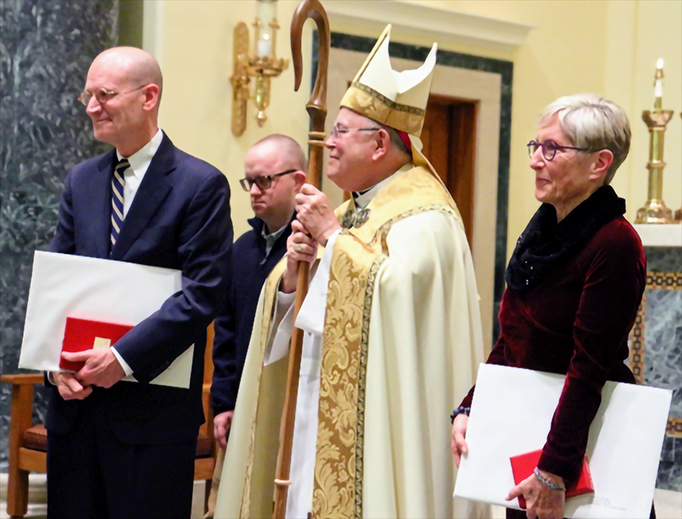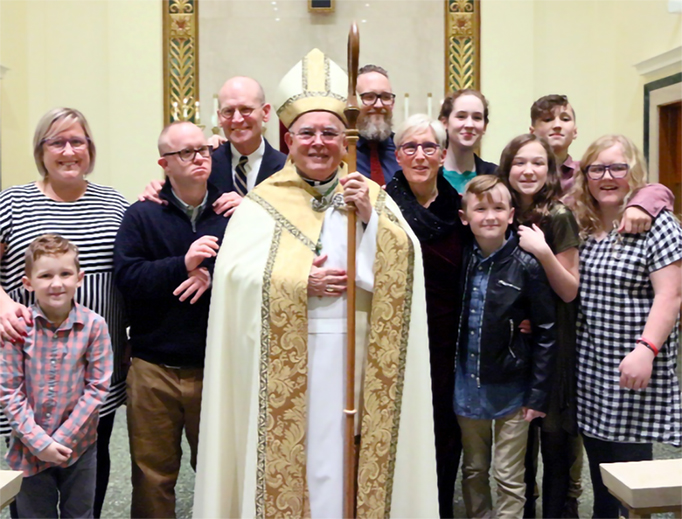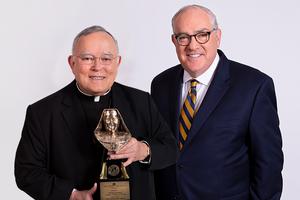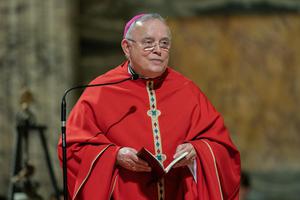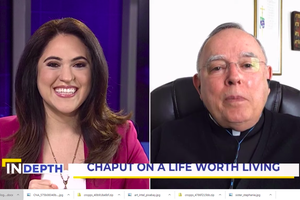Francis X. Maier, Good Servant of a Good Shepherd
“Christianity is fundamentally about friendship,” says the former Register editor in chief and longtime aide to Archbishop Charles Chaput, “and helping each other get to heaven.”

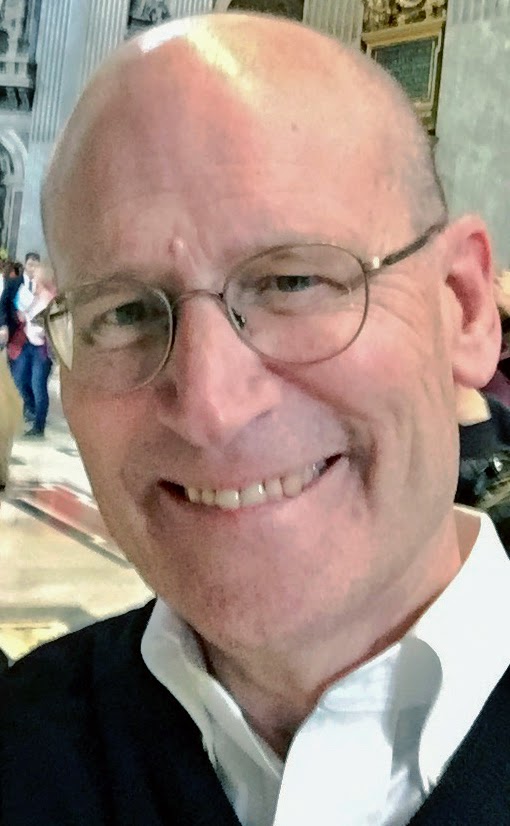
To support his wife and young family and supplement the advance he got from his publisher, he began working part time as an editor for the National Catholic Register, then headquartered in Los Angeles. A few months later he was named editor in chief.
“I just fell in love with it,” Maier, 71, told the Register by phone from Philadelphia. “I never finished the novel. I did the National Catholic Register for the next 15 years of my life.”
That was the start of a now-41-year career working for the Church or Church-related organizations, as he moved from journalism to senior diocesan service, including 23 years as senior adviser and special assistant to Archbishop Charles Chaput in the Denver and Philadelphia Archdioceses.
On Dec. 9, Maier and his wife, Suann, were named “Knight Commander” and “Dame Commander” in the Order of St. Gregory the Great by Pope Francis. The award is given to those who, by their service, have shown extraordinary love for Jesus Christ and his Church.
It is a fitting tribute for Maier as his longtime service to the prelate drew to a close. Bishop Nelson Perez of Cleveland was appointed Archbishop Chaput’s successor Jan. 23. With the exception of Catholic heads of state, diplomats assigned to Vatican City State and others of international standing, the Order of St. Gregory the Great is the highest papal honor granted to laypeople. Maier and his wife were previously inducted into the Order of St. Gregory the Great as “Knight” and “Dame” in 2005 by the now-canonized St. John Paul II. The recent award is a higher rank.
“I’m certainly not going to live long enough to have this happen again!” Maier told the Register with a laugh. “It’s the ‘conclusion to a career’ type of award.”
In presenting the award on behalf of the pontiff, Archbishop Chaput warmly acknowledged Maier’s faithful service and friendship.
“Fran has been my right-hand man,” he told those gathered in the chapel of the Cathedral-Basilica of Sts. Peter and Paul in Philadelphia. “There’s no me without Fran. Fran has helped me to serve the Church as a bishop, and I’m deeply grateful for that.”
Referring to the adage that behind every great man is a great woman, Archbishop Chaput said the Maiers exemplify the truth of that expression and vice versa.
“The archbishop has the right attitude when he points out that no one accomplishes anything if you’re married without the support of your spouse,” Maier told the Register. “Marriage is a covenant between two people, and he likes to underline that by recognizing both spouses, particularly if they’ve both contributed something.”
Native Chicagoan Suann Maier’s award recognized her 41 years as a teacher in Catholic schools as well as her 45 years of leadership and volunteer work in pro-life and special-needs organizations — she founded 14 pro-life centers and 21 pro-life hotlines for women with problem pregnancies — and she has served in leadership and on boards for various Catholic women’s organizations.
In addition to his senior diocesan service, Fran Maier has written, spoken and mentored on Church matters, served as a youth minister and catechist, and been active in Catholic men’s groups. Married 49 years, the Maiers are parents to four children, one of whom has Down syndrome, a genetic chromosomal disorder. Three of their 10 grandchildren also have disabilities. They are both committed to pro-life advocacy.
“God has been very good to us,” Maier said. “I’m very grateful [for the papal honors], but I’m especially grateful that the Holy Father recognized Suann’s service.”
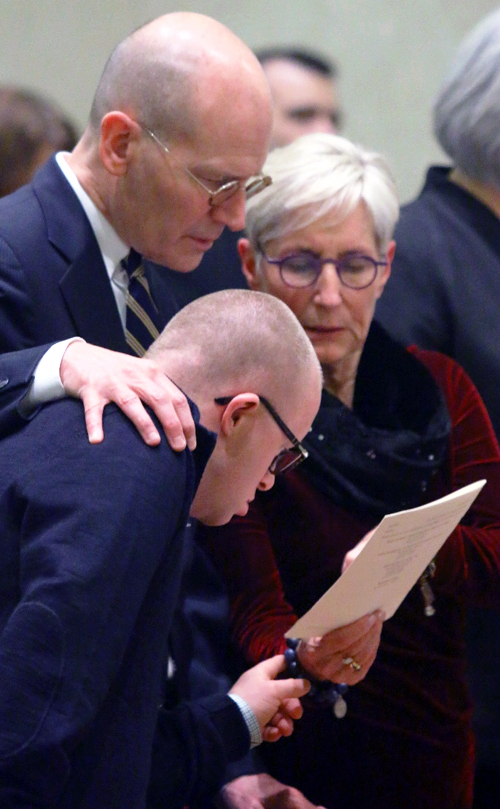
“I think I asked her to marry me after about two months,” Maier said. “We got married the December after we graduated from Notre Dame and St. Mary’s.”
Maier went on to earn a master of fine arts in film and television production from New York University, and he won a fellowship in screenwriting with the American Film Institute in Los Angeles. He became a member of the Writers Guild of America West and worked six years as a screenwriter and a story analyst for United Artists, Warner Bros. and various independent film production companies and talent agencies.
So why did he leave the film industry?
“Hollywood isn’t a very friendly environment,” Maier recalled. “I didn’t like it very much.”
Once he started working for Catholic media, he never looked back.
“The Register was a unique environment then. It was a wonderful environment for creative energy and mentoring and humor and friendship. So many of the people I’ve stayed close to over the years are friends I met at the Register. It was a tremendous experience.
“Of all the things in my life, what I have enjoyed the most and felt was the most formative, was those years as editor in chief at the Register. The great thing about the experience was the people — that was the heart of the matter. Of course I’ve loved working for the archbishop, I admire him a huge amount, but I was a lot younger at the Register. I’m particularly fond of those years.”
Among the friends he made while working at the Register are author and Wall Street Journal editorial board member and columnist William McGurn and author and distinguished senior fellow of Washington’s Ethics and Public Policy Center George Weigel.
“What I most admire about Fran is that he is the real deal: The life he leads as a husband and father is an expression of the ideals he has promoted both as editor of the National Catholic Register and confidant of Archbishop Chaput,” McGurn said via email. Weigel shared similar sentiments.
“There is no ecclesiastical foxhole, or indeed any foxhole, in which I wouldn’t want Fran Maier beside me,” Weigel said, adding that he has high regard for Maier’s “steadiness, his humility and his willingness to work behind the scenes for the greater good of the Church.”
Jenny Kraska, executive director of the Maryland Catholic Conference, met Maier 14 years ago in Denver when he was part of a committee that interviewed her for a position with the Colorado Catholic Conference, which she got. A year later she was named executive director, a role she kept until recently taking the job in Maryland.
“I have heard it said that there are generally five people you will meet in life that will have a lifelong impact on you: Fran is one of those people in my life,” Kraska said. “He is an incredible mentor with a sense of humor I appreciate. … He is a brilliant intellectual with a strategic mind, unlike anyone I have ever encountered.”
Kraska described the Maiers’ marriage as inspirational for the great love and mutual respect they share and expressed joy that they were honored together.
“They are a model Catholic couple,” asserted Weigel.
Maier met French colleague Jean Duchesne, Condorcet College emeritus professor and special adviser to the archbishop of Paris, while working at the Register.
“[Fran] wanted to open up the newspaper to the worldwide cultural resources of Catholicism, and he had heard about what was being done in France under the leadership of the then cardinal-archbishop of Paris, Aaron Jean-Marie Lustiger — an exceptional personality — and also among some of his lay associates: young academics in various fields who had launched the French-speaking edition of the theological journal Communio and worked with such luminaries as Hans Urs von Balthasar, Henri de Lubac, Louis Bouyer, Joseph Ratzinger …,” recalled Duchesne. “When I welcomed Fran at the airport, it did not take me long to realize I had found a brother in Christ, with the same Father in heaven and the same Mother: the Church.”
Duchesne expressed gratitude for Maier’s helpful counsel to him in his role as special adviser to Cardinal Lustiger in navigating the English-speaking world fascinated by “the Jewish cardinal.”
“What has impressed me most is not only Fran’s knowledge, judgment and tireless efficient assistance, it is also the confounding simplicity with which he manages to make the most subtle or paradoxical points,” Duchesne said.
“I see him as a great writer as well as one of the sharpest, clearest and most reliable Christian minds I have ever met — a very rare combination of qualities: The best heads are often incomprehensible and/or irreligious.”
When Archbishop Chaput arrived in Denver in 1997, Maier was delighted to become his special adviser, recalled Duchesne, adding that, later, when he himself met Archbishop Chaput, he understood why. “I discovered a Churchman of the Lustiger class,” he asserted, “… pastorally creative, intellectually keen thanks to his faith, and whom you can support almost as much as he inspires you.”
Maier describes his longtime boss as “the finest leader in the American environment for the Catholic Church.”
“The people who work for him work for him for a long time because they are allowed to contribute to his ministry,” Maier said. “He welcomes that. He also honors their circumstances. If you’re a married person with a family, he’s very respectful of that.”
Maier also appreciates that Archbishop Chaput is clear and consistent in articulating Church teaching.
“He’s rock-solid on the principles of what it means to be a Catholic and to live a Catholic life,” Maier said. “That’s very reassuring.”
What has kept him working for the Church so long?
“You can’t have a richer life than a life active in the Church,” he said. “If you take your life seriously, you want it to have meaning, and nothing provides that meaning more powerfully than a Christian life. Working closely with laypeople and priests and bishops who are committed to the Gospel has been hugely energizing for a very long time.”
What will he and his boss do once Archbishop Chaput’s retirement is approved?
“I think what the archbishop plans to do is take a long vacation,” Maier said with a chuckle. “I think he’s really looking forward to that.”
Archbishop Chaput will likely finish a book he is writing, Things Worth Dying For: Thoughts on a Life Worth Living, which has a 2021 publishing date. Maier believes the archbishop may also keep busy lecturing.
Maier will be joining the Ethics and Public Policy Center as a senior fellow and will be involved with a fellowship program at Notre Dame. The Maiers plan to remain in Philadelphia, as it’s near most of their grandchildren. Archbishop Chaput, too, aims to remain there as archbishop emeritus, Maier said.
Sharing final thoughts, Maier said his work in Catholic journalism and in the Church has been a privilege.
“Christianity is fundamentally about friendship and helping each other get to heaven,” he said. “Working for the Church or anything related to the Church, in some ways, is like anyplace else, with routine pleasures and irritations … but the friendship is pretty extraordinary. As I come to the conclusion of this kind of service, that’s the thing I take away the most — the people who have had a huge impact on me, I’ve met through the Church. That’s been the delight of my career.”
Roxanne King writes from Denver.
